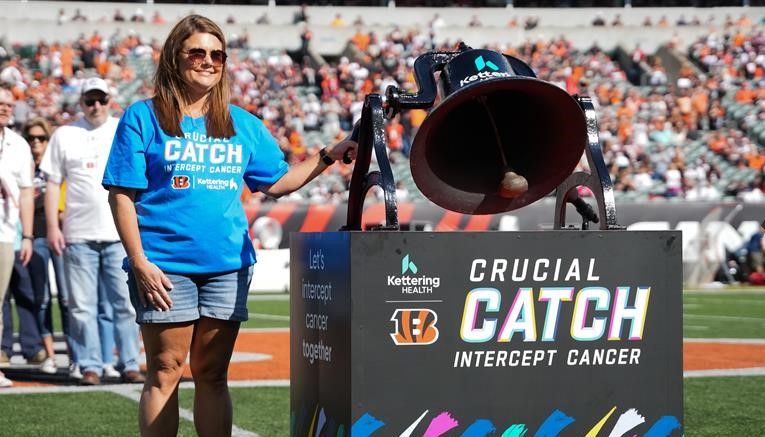Cancer Care
Want to learn more about this at Kettering Health?
PJ Carlisle thought nothing of it when her doctor recommended a colonoscopy.
She felt like herself, except for the blood she noticed in her stool.
“My family doctor just thought I was so young that it was probably just internal hemorrhoids,” PJ said.
But the simple screening led to life-changing news.
A world turned upside down
A high school teacher in her hometown of West Carrollton and a mom, PJ had little time to herself, let alone for a colonoscopy. After she taught teenagers at school, she raised her own at home.
“At the time, I was a single mom,” she said. “I had two teenagers. They were 16 and 13.”
In the summer of 2019, she noticed some symptoms, namely the blood in her stool, but quickly turned her attention to everything but herself.
It wasn’t until Thanksgiving break that she went in for her colonoscopy. She viewed it as part of her holiday checklist before returning to her routine as a teacher.
“I was not expecting to find anything, honestly,” she admitted.
But the screening revealed a large mass in her colon.
She was sent for a CT scan the same day. PJ still didn’t question it. Whatever it was, she thought, it wouldn’t be too bad.
PJ was called into the Cancer Center the following week to meet with Dr. Minia Hellan, a surgical oncologist, and her team. They explained the details of PJ’s diagnosis and her treatment plan.
“They brought out this picture book, and they were showing me the anatomy,” she said. “And I looked at the nurse practitioner for Dr. Hellan and asked her, ‘Do I have cancer?’ because I didn’t really know that’s where they were going.”
“Yes,” replied the nurse.
Systems of support
Weeks later, just as she began Christmas break, PJ began chemotherapy. Then after the holidays, instead of taking time off while in treatment, she continued to teach.
Every other Wednesday, she taught for half the day and then received chemo for seven hours at the Cancer Center. She also wore a chemo pump for 46 hours afterward, returning to the Cancer Center every other Friday evening to have it removed.
Her treatment was taxing. Add to that her already busy days, and PJ found that teaching helped her cope with the anxiety that came with her cancer diagnosis.
“I think coming to school was helpful for me mentally because if I had stayed at home, it would have been worse,” she said. “I had seven hours a day that I could focus on something else.”
When she wasn’t at school, PJ knew her family was always there for her.
“My family was my support system,” she said. “They rallied behind me and helped take care of me.”
A second chance
In August 2020, PJ finally heard the word “remission.”
“It was such a relief and unbelievable,” she said.
She no longer teaches half days for treatment or asks her children for help with her temporary bag from her ileostomy, used to remove waste from the body through a surgically made opening, but she admits that her life will never be the same.
“You may be cancer free,” she said, “but you’re never free of cancer.”
She still has regular appointments with her surgical and medical oncologists, and she admits she feels tired more often than before. But she takes one day at a time and counts them all as a blessing.
“I just think because of my medical doctors and by the grace of God, I’m still here.”









